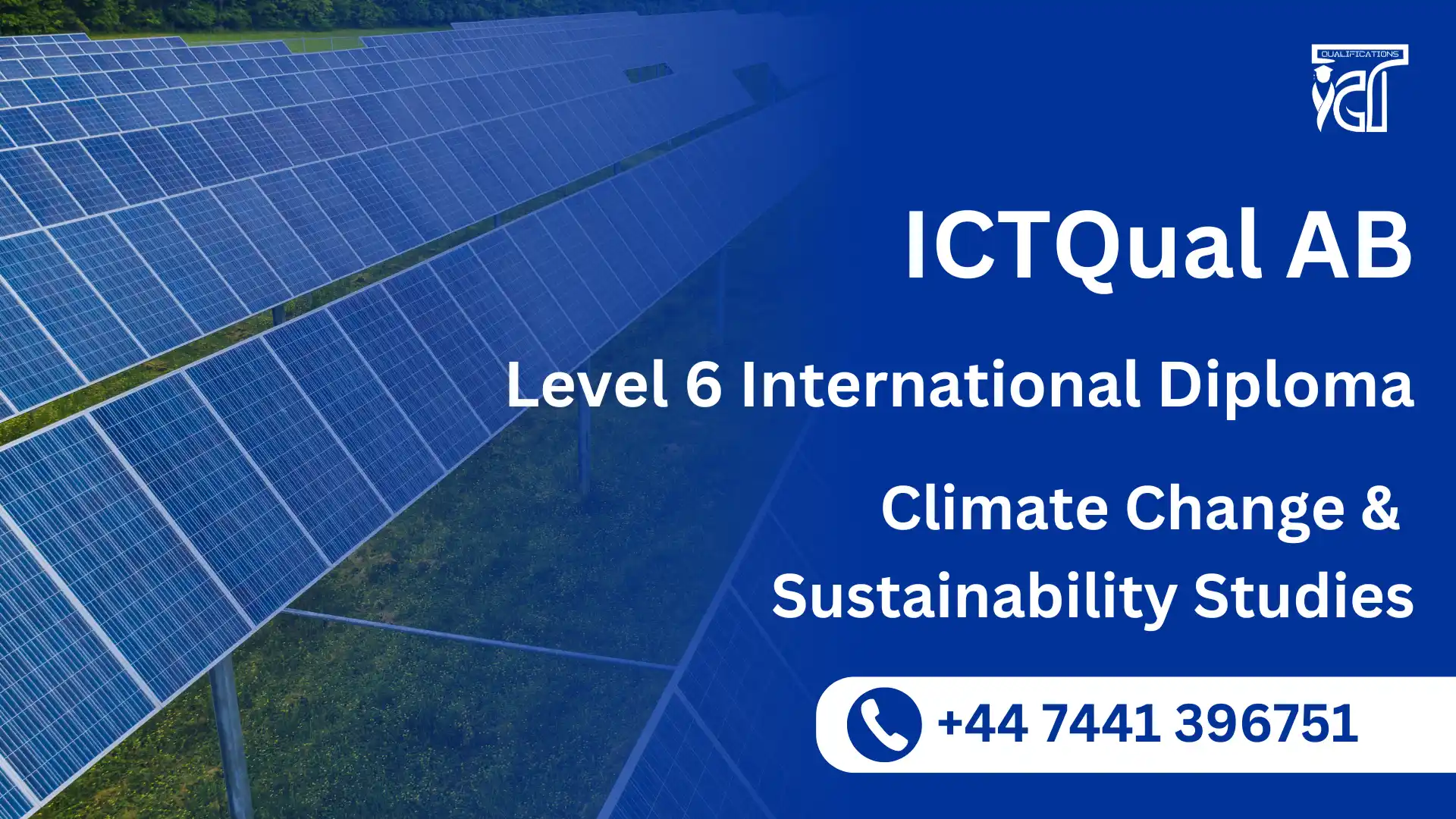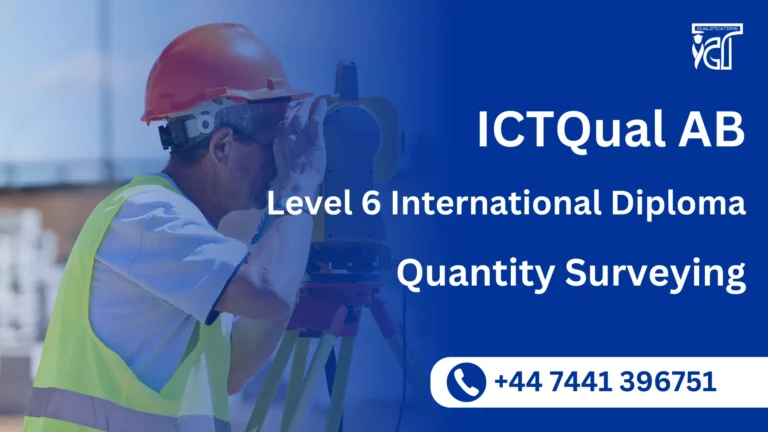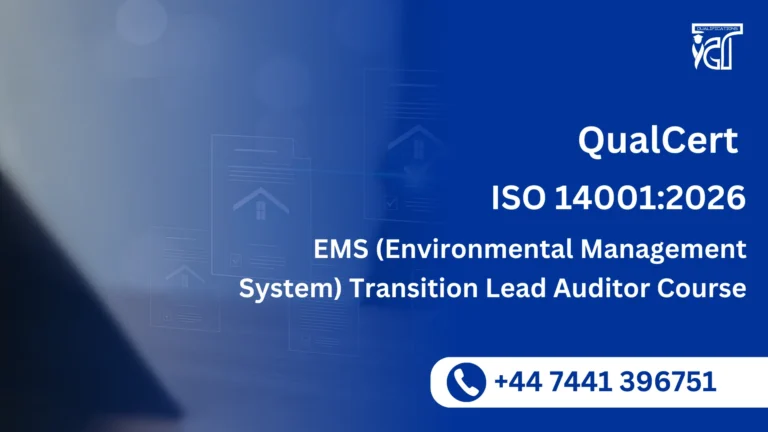The ICTQual AB Level 6 International Diploma in Climate Change & Sustainability Studies is designed for learners aiming to make a tangible impact on environmental and sustainability challenges in today’s rapidly evolving world. Whether you are a professional seeking to enhance your expertise or a fresher eager to launch a career in sustainability, this diploma equips you with the knowledge, skills, and practical insights to thrive in this high-demand field.
Structured over a three-year period with a comprehensive 360-credit framework, the programme offers an in-depth exploration of climate science, environmental policy, sustainable development strategies, and resource management. Learners gain a robust understanding of global and local sustainability challenges, alongside actionable solutions that organisations and communities can implement.
Graduates emerge with a strong professional edge, ready to pursue careers in environmental consultancy, sustainability management, corporate responsibility, policy advising, and renewable energy sectors. The course emphasises critical thinking, strategic planning, and project management skills tailored to sustainability-focused roles, ensuring learners are prepared to influence policy, lead initiatives, and drive environmental innovation.
Key benefits of completing this diploma include enhanced career prospects, advanced subject-matter expertise, and the ability to contribute meaningfully to sustainability projects worldwide. Learners will develop transferable skills in research, data analysis, and environmental governance, positioning themselves as capable and forward-thinking professionals in an industry that continues to expand globally.
By combining theoretical foundations with practical application, this programme provides learners with a holistic and career-oriented education in climate change and sustainability studies, ensuring long-term professional growth and international recognition in the field.
ICTQual AB Level 6 International Diploma in Climate Change & Sustainability Studies
This qualification, theICTQual AB Level 6 International Diploma in Climate Change & Sustainability Studies, consists of 36 mandatory units.
Year 1 – Foundations of Climate Change & Sustainability
- Introduction to Climate Change Science
- Principles of Sustainability and Environmental Management
- Global Environmental Policies and Governance
- Carbon Footprint and Greenhouse Gas Accounting
- Renewable Energy Fundamentals
- Climate Change Impacts and Adaptation Strategies
- Environmental Ethics and Professional Responsibility
- Sustainable Resource Management
- Environmental Monitoring and Data Analysis
- Introduction to Project Planning in Climate Initiatives
- Environmental Communication and Stakeholder Engagement
- Introduction to Risk Assessment in Environmental Management
Year 2 – Applied Climate Change & Sustainability Practices
- Advanced Climate Change Mitigation Strategies
- Sustainable Urban and Industrial Development
- Environmental Impact Assessment (EIA)
- Carbon Management and Trading
- Energy Efficiency and Renewable Integration
- Climate Policy Implementation and Compliance
- Waste Management and Circular Economy Principles
- Environmental Auditing and Reporting Techniques
- Digital Tools and Technologies for Sustainability
- Organisational Behaviour and Sustainability Leadership
- Research Methods in Climate and Sustainability Projects
- Applied Project Planning and Operational Management
Year 3 – Strategic Leadership in Climate Change & Sustainability
- Strategic Sustainability Leadership
- International Climate Agreements and Standards
- Environmental Risk and Crisis Management
- Corporate Social Responsibility (CSR) and Sustainability Strategy
- Sustainable Supply Chain and Resource Management
- Innovation and Emerging Technologies in Sustainability
- Climate Change Policy Development and Implementation
- Environmental Governance and Ethics in Leadership
- Advanced Project Management for Sustainability Initiatives
- Renewable Energy Systems and Integration Strategies
- Independent Research Project in Climate Change & Sustainability
- Capstone Project: Applied Climate Change & Sustainability Studies
Learning Outcomes for the ICTQual AB Level 6 International Diploma in Climate Change & Sustainability Studies 360 Credits – Three Years:
Year 1 – Foundations of Climate Change & Sustainability
1. Introduction to Climate Change Science
- Explain the science behind climate change, including greenhouse gases and global warming.
- Analyse the impact of human activities on climate systems.
2. Principles of Sustainability and Environmental Management
- Apply sustainability principles to organisational and societal contexts.
- Evaluate strategies for sustainable resource use and environmental protection.
3. Global Environmental Policies and Governance
- Interpret international environmental policies and agreements.
- Assess organisational compliance with global environmental regulations.
4. Carbon Footprint and Greenhouse Gas Accounting
- Measure and analyse carbon emissions in various sectors.
- Develop strategies to reduce organisational carbon footprints.
5. Renewable Energy Fundamentals
- Describe key renewable energy sources and technologies.
- Evaluate the environmental and economic impacts of renewable energy adoption.
6. Climate Change Impacts and Adaptation Strategies
- Identify potential environmental, social, and economic impacts of climate change.
- Formulate adaptation strategies to mitigate risks.
7. Environmental Ethics and Professional Responsibility
- Apply ethical principles in climate change and sustainability decision-making.
- Demonstrate accountability and responsibility in environmental projects.
8. Sustainable Resource Management
- Manage natural resources efficiently and sustainably.
- Analyse the environmental consequences of resource use.
9. Environmental Monitoring and Data Analysis
- Monitor environmental indicators using quantitative and qualitative methods.
- Interpret data to inform sustainability decision-making.
10. Introduction to Project Planning in Climate Initiatives
- Develop project plans for climate and sustainability initiatives.
- Identify resources, timelines, and risk considerations for projects.
11. Environmental Communication and Stakeholder Engagement
- Communicate sustainability objectives effectively to stakeholders.
- Develop engagement strategies to promote environmental awareness.
12. Introduction to Risk Assessment in Environmental Management
- Conduct basic environmental risk assessments.
- Propose mitigation measures for identified risks.
Year 2 – Applied Climate Change & Sustainability Practices
1. Advanced Climate Change Mitigation Strategies
- Design and implement mitigation strategies for carbon reduction.
- Evaluate effectiveness and feasibility of climate interventions.
2. Sustainable Urban and Industrial Development
- Apply sustainable development principles in urban and industrial contexts.
- Assess environmental impacts of construction and industrial projects.
3. Environmental Impact Assessment (EIA)
- Conduct comprehensive environmental impact assessments.
- Recommend measures to minimise negative environmental effects.
4. Carbon Management and Trading
- Develop carbon management plans and emission reduction strategies.
- Analyse carbon trading mechanisms and sustainability incentives.
5. Energy Efficiency and Renewable Integration
- Implement energy efficiency measures in industrial and commercial operations.
- Integrate renewable energy technologies into organisational strategies.
6. Climate Policy Implementation and Compliance
- Apply national and international climate policies to organisational settings.
- Monitor compliance and report environmental performance.
7. Waste Management and Circular Economy Principles
- Develop strategies for sustainable waste management and recycling.
- Apply circular economy principles to reduce resource consumption.
8. Environmental Auditing and Reporting Techniques
- Conduct environmental audits to assess sustainability performance.
- Prepare reports in line with international standards and regulations.
9. Digital Tools and Technologies for Sustainability
- Utilise digital tools for monitoring, analysis, and reporting.
- Assess technology effectiveness in supporting sustainability goals.
10. Organisational Behaviour and Sustainability Leadership
- Promote a culture of sustainability within organisations.
- Apply leadership skills to drive environmental initiatives.
11. Research Methods in Climate and Sustainability Projects
- Apply research methodologies to sustainability and climate projects.
- Analyse and interpret data to support decision-making.
12. Applied Project Planning and Operational Management
- Plan and execute operational projects in climate change and sustainability.
- Manage resources, timelines, and stakeholders effectively.
Year 3 – Strategic Leadership in Climate Change & Sustainability
1. Strategic Sustainability Leadership
- Lead organisational sustainability strategies at a strategic level.
- Align projects with global sustainability objectives.
2. International Climate Agreements and Standards
- Evaluate international climate agreements and their impact on organisations.
- Ensure organisational compliance with global sustainability standards.
3. Environmental Risk and Crisis Management
- Identify and manage risks in complex environmental projects.
- Develop contingency plans for environmental crises.
4. Corporate Social Responsibility (CSR) and Sustainability Strategy
- Integrate CSR strategies into sustainability planning.
- Measure and report organisational social and environmental impact.
5. Sustainable Supply Chain and Resource Management
- Implement sustainable practices across supply chains.
- Analyse resource flows and optimise for environmental efficiency.
6. Innovation and Emerging Technologies in Sustainability
- Evaluate new technologies for energy, resource efficiency, and emissions reduction.
- Apply innovative solutions to complex sustainability challenges.
7. Climate Change Policy Development and Implementation
- Develop organisational climate policies and procedures.
- Implement and monitor policy effectiveness in operational settings.
8. Environmental Governance and Ethics in Leadership
- Promote ethical practices and governance frameworks in environmental management.
- Ensure decision-making aligns with international environmental standards.
9. Advanced Project Management for Sustainability Initiatives
- Plan, manage, and evaluate complex sustainability projects.
- Ensure projects meet technical, environmental, and regulatory objectives.
10. Renewable Energy Systems and Integration Strategies
- Design and implement renewable energy solutions for organisations.
- Assess environmental, technical, and financial feasibility.
11. Independent Research Project in Climate Change & Sustainability
- Conduct independent research on a relevant sustainability topic.
- Analyse findings and present evidence-based recommendations.
12. Capstone Project: Applied Climate Change & Sustainability Studies
- Integrate knowledge and skills from all units into a comprehensive project.
- Demonstrate applied problem-solving, strategic planning, and sustainability leadership.
Completing the ICTQual AB Level 6 International Diploma in Climate Change & Sustainability Studies provides learners with a comprehensive skill set, industry-recognised knowledge, and practical expertise that significantly enhances their career prospects. The programme equips learners to tackle complex sustainability challenges, drive innovative solutions, and excel in a rapidly evolving global environmental sector.
1. Advanced Knowledge in Climate Change and Sustainability
- Deep understanding of climate science, environmental policies, and sustainable development strategies.
- Awareness of global and regional environmental challenges.
- Insight into renewable energy, carbon management, and ecological conservation.
- Knowledge of sustainability reporting and corporate environmental responsibility.
- Ability to analyse and interpret environmental data effectively.
2. Career Advancement Opportunities
- Enhanced employability in environmental consultancy, sustainability management, and policy advisory roles.
- Preparation for leadership positions in corporate sustainability initiatives.
- Eligibility for roles in renewable energy, NGOs, and government environmental agencies.
- Increased potential for international career opportunities.
- Strong foundation for entrepreneurial ventures in sustainability-focused businesses.
3. Practical Skills Development
- Hands-on experience in project management and strategic planning.
- Training in environmental auditing and risk assessment.
- Competence in sustainability-focused research and data analysis.
- Ability to design and implement impactful environmental projects.
- Development of problem-solving and decision-making skills tailored to sustainability challenges.
4. Professional Recognition and Credibility
- Programme aligned with international standards of excellence.
- Demonstrates commitment to environmental responsibility and professional growth.
- Enhances professional reputation in global sustainability networks.
- Provides learners with a verifiable qualification recognised across industries.
- Strengthens credibility for consulting, advisory, and leadership roles.
5. Long-term Personal and Societal Impact
- Empowers learners to drive meaningful environmental change.
- Encourages sustainable practices in organisations and communities.
- Supports personal growth through ethical and socially responsible learning.
- Contributes to global efforts in combating climate change.
- Builds confidence in influencing policy and sustainability strategies at local and international levels.
The ideal learner for the ICTQual AB Level 6 International Diploma in Climate Change & Sustainability Studies is someone who is passionate about making a positive environmental impact and is eager to develop expertise in sustainability practices. This programme is designed to accommodate both freshers seeking to start a career in the environmental sector and professionals looking to advance or specialise in climate change and sustainability management.
1. Aspiring Environmental Professionals
- Fresh learners aiming to build a career in sustainability, environmental consultancy, or renewable energy.
- Individuals interested in climate science, conservation, and ecological management.
- Learners seeking to gain a solid foundation in global and regional environmental policies.
- Those motivated to contribute to sustainable development initiatives.
- Enthusiastic learners ready to engage in research and practical sustainability projects.
2. Experienced Professionals Seeking Career Growth
- Professionals in corporate, government, or NGO sectors who want to specialise in sustainability.
- Individuals aiming for leadership or advisory roles in environmental management.
- Managers and consultants seeking advanced knowledge in climate change mitigation and adaptation.
- Learners looking to enhance their strategic planning and project management skills in sustainability contexts.
- Professionals aiming to strengthen their international credibility and employability.
3. Learners Interested in Policy and Governance
- Individuals keen to understand environmental regulations, compliance, and sustainability reporting.
- Those who aspire to influence corporate or governmental sustainability strategies.
- Learners interested in ethical decision-making and corporate social responsibility initiatives.
- Those who want to develop skills in environmental auditing and governance.
- Learners motivated to engage in policy advocacy and sustainability planning.
4. Tech-Savvy and Analytical Thinkers
- Learners who enjoy analysing data, interpreting research, and applying it to real-world problems.
- Individuals comfortable with digital tools and sustainability modelling techniques.
- Those capable of critical thinking and problem-solving in complex environmental scenarios.
- Learners interested in using technology to optimise sustainability practices.
- Those who value evidence-based decision-making in climate action initiatives.
5. Global and Socially Conscious Learners
- Individuals motivated by environmental responsibility and social impact.
- Learners interested in contributing to global sustainability goals.
- Those who value ethical, socially responsible practices in professional and personal contexts.
- Learners seeking to work in international teams and cross-cultural sustainability projects.
- Individuals passionate about creating long-term positive change for communities and the planet.
Completing the ICTQual AB Level 6 International Diploma in Climate Change & Sustainability Studies opens a wide range of career opportunities and professional advancement pathways. Learners are equipped with advanced knowledge and practical skills that prepare them for leadership roles, specialised positions, and further academic or professional development in the rapidly growing sustainability and environmental sector.
1. Career Advancement in Sustainability Roles
- Transition into managerial positions in environmental consultancy firms.
- Lead sustainability initiatives in corporate organisations or government agencies.
- Take on advisory roles in climate change mitigation and adaptation projects.
- Manage corporate social responsibility (CSR) and sustainability reporting programmes.
- Develop expertise in renewable energy, waste management, and sustainable urban planning.
2. Specialised Professional Opportunities
- Work as sustainability analysts, environmental policy advisors, or climate risk consultants.
- Contribute to research and development projects focused on sustainable technologies.
- Engage in environmental impact assessments and ecological conservation programmes.
- Join international NGOs or global organisations focused on sustainability and climate action.
- Explore roles in water and energy management, green infrastructure, and biodiversity protection.
3. Leadership and Strategic Roles
- Take on leadership positions within sustainability and environmental departments.
- Oversee strategic planning for sustainable business practices and projects.
- Guide cross-functional teams in achieving corporate sustainability goals.
- Influence organisational decision-making to integrate environmental responsibility.
- Build credibility as a sustainability thought leader within industry networks.
4. Academic and Professional Development
- Pursue further studies in environmental management, climate change, or sustainability.
- Gain professional certifications in specialised areas of environmental science or sustainability.
- Participate in international conferences, workshops, and knowledge-exchange programmes.
- Engage in research that influences policy and practice in climate and sustainability.
- Enhance credentials for teaching or consultancy roles in environmental education.
5. Global and Entrepreneurial Opportunities
- Explore international career prospects in multinational organisations.
- Launch sustainability-focused entrepreneurial ventures or green businesses.
- Contribute to global sustainability initiatives and climate change projects.
- Collaborate with international experts on cross-border environmental challenges.
- Become a recognised professional driving long-term impact in the sustainability sector.
As an approved ICTQual AB centre, we provide two distinct certification routes designed to accommodate both experienced professionals and fresh learners, ensuring that every learner can achieve the diploma in a way that suits their background and experience.
Route 1: Experienced Professionals
- Designed for learners with at least six years of verifiable experience in sustainability, environmental management, or related sectors.
- Recognises prior expertise, allowing experienced professionals to focus on advanced modules, practical applications, and strategic projects.
- Ideal for learners seeking career advancement, leadership roles, or specialised positions in climate change and sustainability.
- Experienced learners can leverage their professional knowledge to complete the programme more efficiently, combining their work experience with academic learning.
Route 2: Fresh Learners
- Tailored for individuals who are new to sustainability and climate change studies.
- Requires the completion of 36 structured assignments covering all key areas of the diploma.
- Designed to build comprehensive knowledge from the ground up, providing learners with both theoretical understanding and practical skills.
- Ideal for fresh learners looking to launch a career in environmental consultancy, sustainability management, or renewable energy sectors.
All learners must enrol with us at our approved ICTQual AB centre to begin their journey. Our structured support, resources, and guidance ensure that every learner—whether experienced or new—can successfully achieve their diploma and gain internationally recognised credentials in climate change and sustainability studies.
Entry Requirements
1. Minimum Age
- Learners must be 18 years or older at the time of enrolment.
2. Educational Background
- Experienced Professionals (Route 1): No formal educational requirement, though a Level 5 qualification in a relevant discipline (e.g., environmental science, sustainability, or management) is advantageous.
- Fresh Learners (Route 2): A Level 3 qualification (such as A-levels or equivalent) is typically required to ensure readiness for diploma-level study.
3. Experience
- Route 1: A minimum of 6 years of verifiable professional experience in sustainability, environmental management, or related sectors.
- Route 2: Fresh learners are not required to have prior experience but must complete 36 structured assignments throughout the programme.
4. Language Proficiency
- Learners must demonstrate proficiency in English, both written and spoken, to engage effectively with course materials and assessments.
- For non-native speakers, an IELTS score of 5.5 or equivalent is recommended.
Register Now
Qualification Process
Qualification Process for the ICTQual AB Level 6 International Diploma in Climate Change & Sustainability Studies
- Self-Assessment:
Begin by evaluating your eligibility to ensure you meet the qualification requirements, including work experience, knowledge, and language proficiency. - Registration:
Complete your registration by submitting the required documents, including a scanned copy of a valid ID, and paying the registration fee. - Induction:
An assessor will conduct an induction to confirm your eligibility for the course and explain the evidence requirements. If you do not meet the criteria, your registration will be cancelled, and the fee will be refunded. - Assignments & Evidence Submission:
Provide all assignments and the necessary evidence based on the assessment criteria outlined in the course. If you are unsure of the required evidence, consult with the assessor for guidance on the type and nature of evidence needed. - Feedback and Revision:
The assessor will review your submitted evidence and provide feedback. Evidence that meets the criteria will be marked as “Criteria Met,” while any gaps will be identified. You will be asked to revise and resubmit if needed. - Competence Evidence:
Submit final evidence demonstrating that all learning outcomes have been met. This evidence will be marked as “Criteria Met” by the assessor once it is satisfactory. - Internal Quality Assurance (IQA):
The Internal Quality Assurance Verifier (IQA) will review your evidence to ensure consistency, quality, and compliance with standards. - External Verification:
The IQA will submit your portfolio to ICTQUAL AB External Quality Assurance Verifiers (EQA) for final confirmation. The EQA may contact you directly to verify the authenticity of your evidence. - Certification:
Upon successful completion of all checks, ICTQUAL AB will issue your official certificate, confirming that you have attained the ICTQual AB Level 6 International Diploma in Climate Change & Sustainability Studies.







